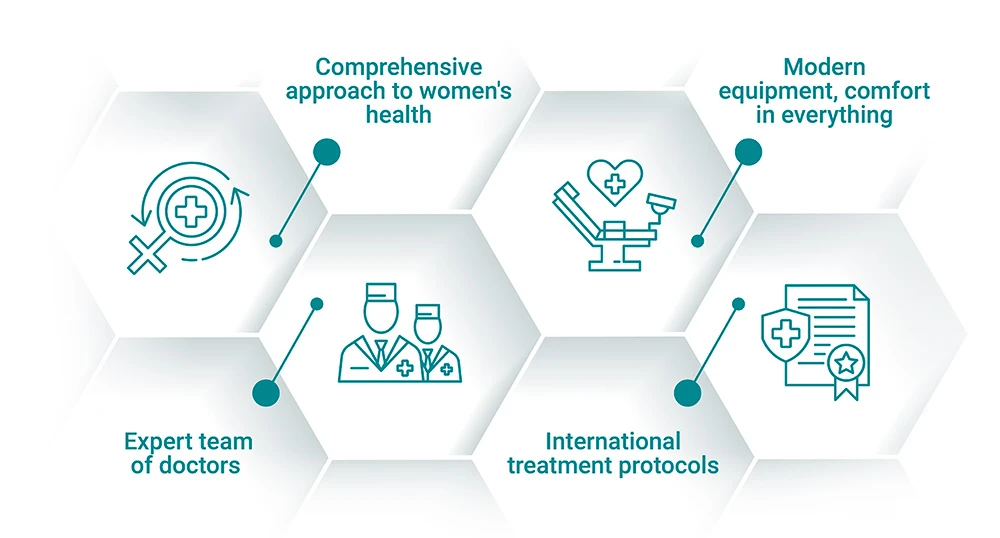Planning for Pregnancy I.D.Clinic - Art of Medicine

Planning for pregnancy helps prepare the body both psychologically and physically, reducing the risk of complications.
Proper preparation for pregnancy contributes to successful conception and an optimal pregnancy experience.
What is planning for pregnancy?
This is a comprehensive examination of future parents to minimize risks during pregnancy.
Main stages of preparation for conception:
- Medical examination before pregnancy.
- Tests for future parents.
- Giving up bad habits.
Future parents' health: what needs to be considered?
The physical condition of both parents affects conception and the development of the child. Conception requires genetic material from both parents, and its quality depends on the age and lifestyle of the couple.
Reproductive health is important for successful conception and carrying the pregnancy to term.
Fertility testing for future parents includes: sperm analysis, ultrasound, and blood tests.
Why I.D.CLINIC
Doctors
Pre-pregnancy examination
Tests to take before pregnancy: complete blood count, hormones, blood type, Rh factor, TORCH infections, sexually transmitted infections, and PAP test.
Pelvic ultrasound with follicle count and confirming ovulation are important for assessing fertility.
Genetic counseling and testing for hereditary diseases are important for couples with a family history of genetic disorders or pregnancy loss.
Gynecologists, urologists, and reproductive specialists play a key role in preparing for pregnancy. They conduct comprehensive examinations and provide guidance on preparing for a healthy pregnancy.
Nutrition and vitamins for pregnancy planning
Proper balanced nutrition, including meat, fish, vegetables, and fruits, supports the couple’s physical health and improves fertility, contributing to successful conception.
It is important to take: folic acid (prevents neural tube defects), iron (maintains hemoglobin levels), omega-3 (supports immunity).
Include in the diet during pregnancy: vegetables, fruits, cooked meat, and fish. Avoid alcohol and raw products.
Healthy lifestyle before pregnancy
Smoking and alcohol reduce fertility and the quality of sex cells, increasing the risk of complications during pregnancy.
Physical activity strengthens muscles, reducing the load on the back, which contributes to endurance during pregnancy.
Stress disrupts hormonal balance, negatively affecting conception. To minimize it, practice yoga, meditation, and sports.
Features of pregnancy planning after 30 years
Preparation for pregnancy after 30 requires special attention, as the quality of sex cells decreases with age, and the risk of complications increases.
To check fertility and maintain reproductive health, it is important to consult a reproductive specialist.
Planning a second pregnancy should include assessing health after the first pregnancy, weight correction, and normalizing hormonal balance and psycho-emotional state.
Consultations with specialists during the pregnancy planning process
A gynecologist assesses a woman’s health, conducts necessary examinations, and provides advice to future parents on preparing for conception.
It is recommended to consult a reproductive specialist if pregnancy does not occur after 1 year of trying (for women under 35) or 6 months of trying (for women over 35).
When choosing a clinic, it is important to evaluate the doctors’ qualifications, patient reviews, and the convenience of the location.
Prevention of pregnancy complications
Proper planning helps identify diseases and normalize health indicators before pregnancy, which prevents complications.
Before pregnancy, it is important to be vaccinated against the following infections: rubella, diphtheria, tetanus, hepatitis B, chickenpox, whooping cough, flu.
Weight control and hormonal balance are integral parts of pregnancy planning for women. Excess weight can lead to increased blood pressure, which carries a range of consequences for both the mother and the fetus.
Frequently asked questions about pregnancy planning
- When is the best time to start preparing for pregnancy?
3-6 months before the planned conception. - What tests are mandatory for the couple?
Blood tests, ultrasound, sperm analysis, infection swabs, PAP test. - How to know if you need the help of a reproductive specialist?
It is needed if pregnancy does not occur after 1 year of trying (under 35 years old) or 6 months of trying (over 35 years old). - What vitamins should be taken before pregnancy?
Folic acid, iron, omega-3.
The pregnancy planning program is important for the health of the mother, father, and child. It minimizes risks for both the mother and the baby.
Contact a pregnancy planning specialist today and start the necessary examinations for the health of you and your future baby.
Reviews
Ирина
Очень внимательный, располагающий доктор. Понравилась четкость и понятность ответов на вопросы. Хороший специалист.
Відгук від партнерів doc.ua
Елена
Приемом довольна на все сто процентов , Благодарю специалиста.Заслуживает высшего балла
Відгук від партнерів doc.ua
Уляна
Лікар гарний, молодший персонал кваліфікований. Буду записуватись в майбутньому. Дякую!
Відгук від партнерів doc.ua
Маргарита
Лікар дала відповіді на всі мої запитання.Все добре пройшло.
Відгук від партнерів doc.ua
Тетяна
Приємно було знаходитися на візиті.
Відгук від партнерів doc.ua
Prices
Definition of chronic endometritis
Gynecology
3700 грн
Ехогістеросальпінгографія з анестезією
Гінекологія
7500 грн
Пункція кісти яєчника з анестезією під контролем узд
Гінекологія
6800 грн
Radiowave destruction of the cervix (with anesthesia)
Gynecology
1700 грн
Endometrial aspiration (pipeline biopsy)
Gynecology
600 грн
Introduction of an intrauterine contraceptive (IUD)
Gynecology
1200 грн
Removal of an intrauterine contraceptive device (IUD)
Gynecology
1000 грн
Laser removal of isolated benign skin neoplasms (papillomas, condylomas)
Gynecology
1000 грн
Treatment of the cervix with Solkovagin (without the cost of the drug)
Gynecology
450 грн
LASER PROCEDURES
Complex treatment of vaginal relaxation syndrome and urinary incontinence / 1 procedure
Gynecology
6500 грн
Laser vaginal rejuvenation /1 procedure)
Gynecology
6500 грн
OVARIAN REJUVENATION
PRP rejuvenation (plasma therapy) of the ovaries
Gynecology
32300 грн
Ovarian rejuvenation using stem cells
Gynecology
64800 грн
PREGNANCY MANAGEMENT
AESTHETIC GYNECOLOGY
Defloration
Gynecology
3500 грн
G-spot augmentation taking into account drugs
Gynecology
8500 грн
Vaginal rejuvenation + gift (laser treatment of the external labia)
Gynecology
6500 грн
Vaginoplasty (one wall)
Gynecology
25000 грн
Intimate filling (lip contouring, augmentation of the G zone) + drug (the cost depends on the manufacturer)
Gynecology
4 500 грн
Doctor’s consultation
Gynecology
700 грн
Labiaplasty (all inclusive)
Gynecology
35000 грн
Co2 laser rejuvenation
Gynecology
6500 грн
Plasmolifting – PRP
Gynecology
3500 грн




